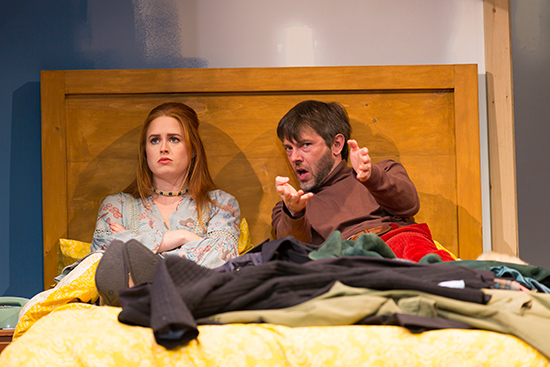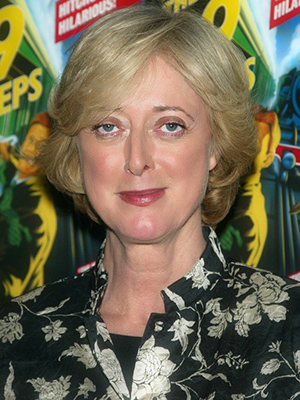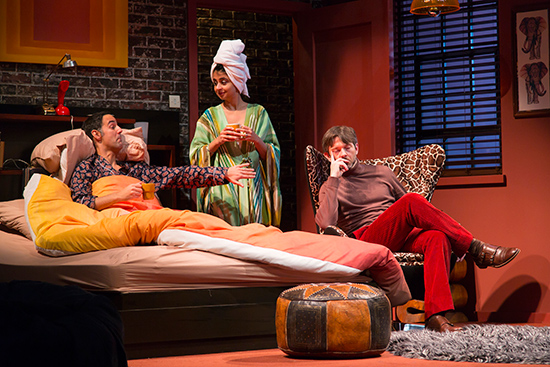At Home with Huntington’s Bedroom Farce
Director Aitken shepherds theater company’s first Ayckbourn play

An argument between Susannah (Katie Paxton) and Trevor (Karl Miller) touches off comic consequences for three other couples in the Huntington Theatre Company’s production of Bedroom Farce. Photo by T. Charles Erickson
Back in 1977, Maria Aitken played one of the leads in the London premiere of Alan Ayckbourn’s Bedroom Farce, codirected by the playwright. She says she doesn’t remember a thing about the experience that could help her direct the Huntington Theatre Company production of the Ayckbourn comedy, running through December 11 at the Boston University Theatre.
One of those London performances, however, was unforgettable.
“I was about to audition for A Fish Called Wanda, and John Cleese came to check me out,” she says. “Mercifully, his date failed him, and he had an empty seat beside him. He’s huge in length, and he flailed like a windmill with laughter, taking up both seats. And he also has a very idiosyncratic laugh, so whenever he laughed helplessly, the audience laughed at him. He would stop laughing, and they would stop, and then he would remember how funny it was and start again.”

At one point, she says, the cast stood and waited for seven full minutes for the laughter to subside. “I made the palms of my hands bleed because of digging in my fingernails,” she says. “You can’t laugh yourself. So we were all in an agony up there. And the next day I went in for the audition, and I just marched in and spread out my hands and said, ‘Look at my palms! That’s what you did.’”
What did Cleese say?
“Well,” she says, “I got the part in Fish Called Wanda, so he may have felt guilty.”
The Bedroom part of the play’s title is literally accurate. When Susannah, the part Aitken played in the 1977 premiere, catches husband Trevor in an illicit kiss with an old flame, they spread chaos in the bedrooms of three other married couples over the course of a single night and the following morning. But, Aitken says, this isn’t the randy, mechanistic sort of Farce that people might expect.
“There aren’t any slamming doors—well, maybe one—and there’s nobody running about in their knickers,” she says. “As Alan himself said about it, a lot may go on in those bedrooms, but not copulation—never any copulation in a British bedroom.”
Bedroom Farce is character-driven, a story of egomania sabotaging the lives of other people. “It isn’t dark like some Ayckbourns are dark,” Aitken says. “This is more straightforwardly funny. But he is incapable of not writing full human beings, so it’s not all just jolly, you know?”
After a fight, Susannah and Trevor arrive separately at their friends Malcolm and Kate’s for a party, where she catches him kissing his former girlfriend, Jan. While Susannah vents to Trevor’s parents, Trevor decides to try to straighten things out with Jan and her bedridden husband, Nick. Much is revealed about the state of the various couples—and couplehood in general—before Susannah and Trevor reach a (perhaps shaky) reconciliation.
“Alan Ayckbourn is one of the great living comedic minds of English dramatic literature, and bringing Maria back to direct this seemed like a no-brainer,” says Huntington artistic director Peter DuBois. “While I knew I was programming this comedy during an election season, I honestly had no idea how much we would need a good laugh once all the votes are counted.”

Karl Miller, who played off Broadway in The Liquid Plain at Signature Theatre in 2015, and Katie Paxton play Trevor and Susannah. Paxton has been in several PlayMakers Repertory Company productions. The rest of the cast includes local favorite Nael Nacer, often seen in Huntington shows, including The Seagull, directed by Aitken in 2014.
The production sticks to the 1970s, complete with vintage clothes from the era and its appalling décor, Aitken says. In part, that’s because Bedroom Farce arose from that time, but it’s also because ’70 props make the comic complications work. “A landline telephone—you couldn’t have the play without it,” she says.
Although she made her mark as an actress, Aitken has focused on directing in recent years, and she’s been doing plenty of it at the Huntington. She’s helmed a wide range of the company’s productions, from The Seagull to Private Lives (2012) to Alfred Hitchcock’s The 39 Steps (2007).
“I’ve never directed an Ayckbourn, and I like doing things I’ve never done before,” Aitken says. “I’m about to direct a Molière somewhere else, and I’ve never done one, and I’m going to do a Strindberg, and I’ve never done one. It’s kind of thrilling.”
The directing process is the same, though, she says. You have to make a world each time, whether the play is set in 1970s suburban bedrooms or Chekhov’s Russia. She’s glad she doesn’t remember much about that long-ago London production, as it’s “rather an impediment” to carry a mental blueprint from a previous production. But a few things have come to mind.
“What I do have a vestigial memory of is certain inflections that worked triumphantly,” she says. “Things that got gigantic laughs are imprinted somewhere in my memory.”
The Huntington Theatre Company production of Bedroom Farce is running at the BU Theatre, 264 Huntington Ave., Boston, through December 11. Purchase tickets online, by phone at 617-266-0800, or in person at the BU Theatre box office. Patrons 35 and younger may purchase $30 tickets (ID required) for any production, and there is a $5 discount for seniors. Military personnel can purchase tickets for $20 with promo code MILITARY, and student tickets are available for $20 (valid ID required). Members of the BU community get $10 off (ID required). The Thursday, November 17, performance is College Night; BU students with ID can receive two free tickets at the box office or by following this link, and are encouraged to wear their pajamas to the show. Call 617-266-0800 for more information. Follow the Huntington Theatre Company on Twitter at @huntington.

Comments & Discussion
Boston University moderates comments to facilitate an informed, substantive, civil conversation. Abusive, profane, self-promotional, misleading, incoherent or off-topic comments will be rejected. Moderators are staffed during regular business hours (EST) and can only accept comments written in English. Statistics or facts must include a citation or a link to the citation.